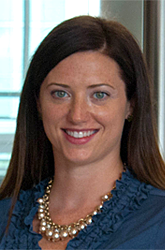You are here: Home > Unit on Reproductive and Regenerative Medicine
Reproductive Stem Cell Biology

- Erin F. Wolff, MD, Head, Unit on Reproductive and Regenerative Medicine
- Ryan Heitmann, DO, Reproductive Endocrinology and Infertility Fellow
- Nima Vahidi, BS, Postbaccalaureate Fellow
The Unit on Reproductive and Regenerative Medicine conducts translational research on disorders affecting reproduction. Particular areas of interest are reproductive tract stem cells and cellular therapies to treat reproductive disorders. We study endometrial stem cells and conditions affecting the endometrium, which can result in a wide variety of gynecologic problems such as scarring of the uterine cavity (Asherman’s syndrome), abnormal uterine bleeding, endometriosis, infertility due to implantation failures, and recurrent pregnancy loss. We also study stem cells from the ovary to determine their potential for forming oocytes, which could provide new ways to treat women with infertility.
Current research
We focus on characterizing endometrial stem-cell function, possible therapeutic applications of endometrial stem cells, sources of endometrial stem cells, and cellular therapies to correct endometrial related conditions. The model systems we use include (i) patients at the NIH who have undergone hematopoietic stem-cell transplantation for non-malignant hematologic conditions (e.g., sickle cell disease); (ii) the autologous Rhesus macaque peripheral blood stem-cell transplant model created by our collaborators in the Tisdale lab. We use the models to study endometrial engraftment from bone marrow–derived cells and the endometrial effects of bone marrow–derived cells residing in the uterus.
We also study a rare familial syndrome, with a reproductive phenotype, resulting from a germline mutation in the HRPT2 gene. Patients with this disorder suffer from life-threatening heavy menstrual bleeding (often requiring hysterectomy at young ages), recurrent pregnancy loss, and benign and malignant uterine tumors (frequently mesodermal lineages). We use endometrial cells from patients with this condition to generate reproductive disease–specific, induced pluripotent stem cells with which to study reproductive disorders.
In the ovary, we study stem cells to determine whether they can produce viable oocytes, using an autologous non-human primate transplant model. We also examine the potential role of ovarian stem cells in women with premature primary ovarian insufficiency.
Additional Funding
- American Society of Reproductive Medicine KY Cha Award in Stem Cell Technology
Publications
- Wolff EF, He Y, Black D, Brinton EA, Budoff MJ, Cedars M, Hodis HN, Lobo RA, Manson JE, Merriam GR, Miller VM, Naftolin F, Pal L, Santoro N, Zhang H, Harman SM, Taylor HS. Self-reported menopausal symptoms and cardiovascular risk profile in recently menopausal women screened for the Kronos Early Estrogen Prevention Study (KEEPS). Fertil Steril 2013;99:1385-1391.
- Wolff EF, Sun L, Hediger ML, Peterson CM, Chen Z, Buck Louis GM. In utero exposures and endometriosis: the Endometriosis, Natural History, Disease, Outcome (ENDO) Study. Fertil Steril 2013;99:790-795.
- Wolff EF, Uchida N, Donahue RE, Metzger ME, Libfraind LL, Hill MJ, Tisdale JT. Peripheral blood stem cell transplants do not result in endometrial stromal engraftment. Fertil Steril 2013;99:526-532.
- Wolff EF, Hill MJ, Simonds WF, Segars JH. Aromatase inhibitor treatment of menorrhagia and subsequent pregnancy in a patient with familial hyperparathyroidism-jaw tumor syndrome. Fertil Steril 2012;19:2065-2071.
- Wolff EF, Gao XB, Yao KV, Du H, Andrews ZB, Elsworth JD, Taylor HS. Endometrial stem cell transplantation restores dopamine production in a Parkinson’s disease model. J Cell Mol Med 2011;15(4):747-755.
Collaborators
- Cynthia Dunbar, MD, Hematology Branch, NHLBI, Bethesda, MD
- Sunni Mumford, PhD, Division of Epidemiology, Statistics & Prevention Research, NICHD, Rockville, MD
- William Simonds, MD, Metabolic Diseases Branch, NIDDK, Bethesda, MD
- Hugh S. Taylor, MD, Yale School of Medicine, New Haven, CT
- John Tisdale, MD, Molecular and Clinical Hematology Branch, NHLBI, Bethesda, MD
Contact
For more information, email wolffe@mail.nih.gov.

